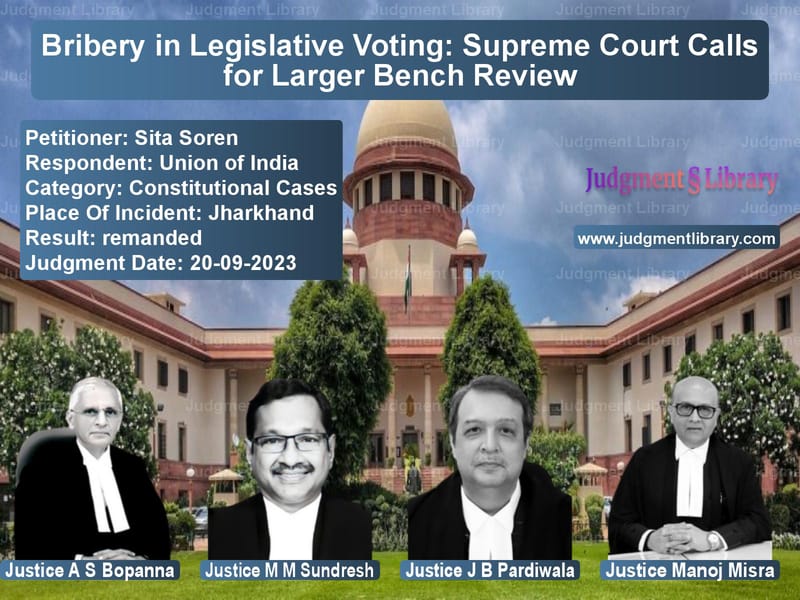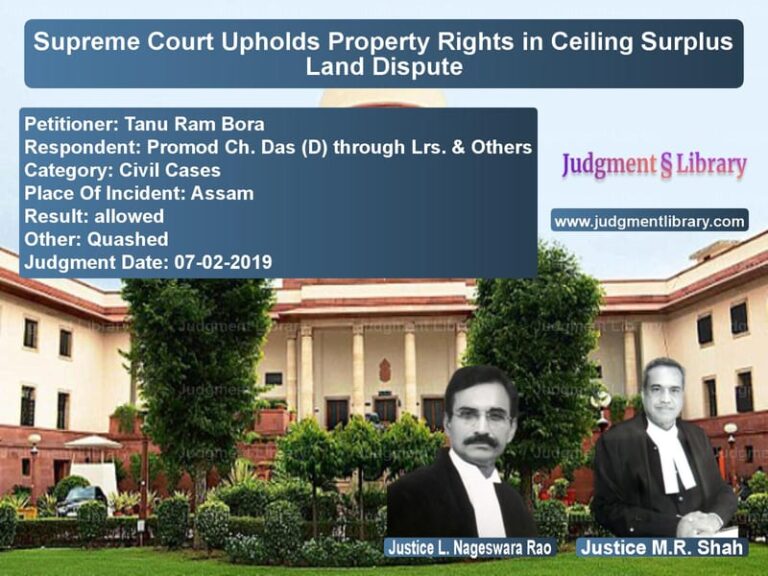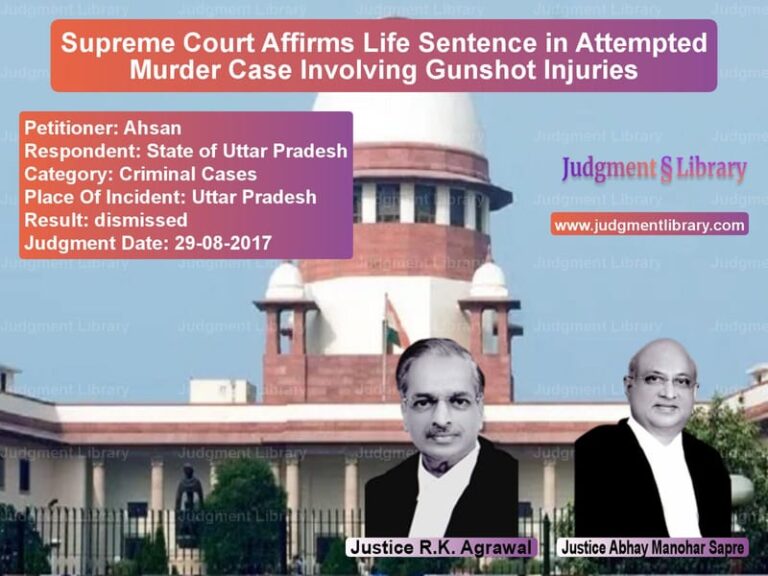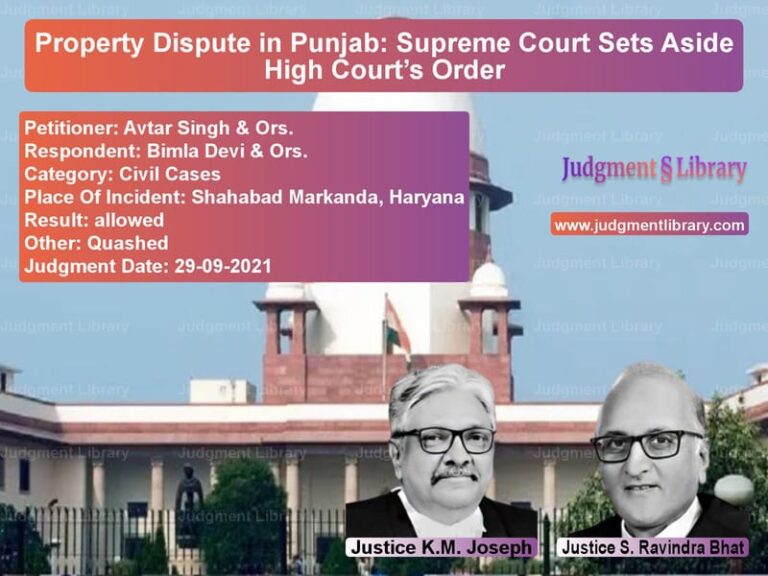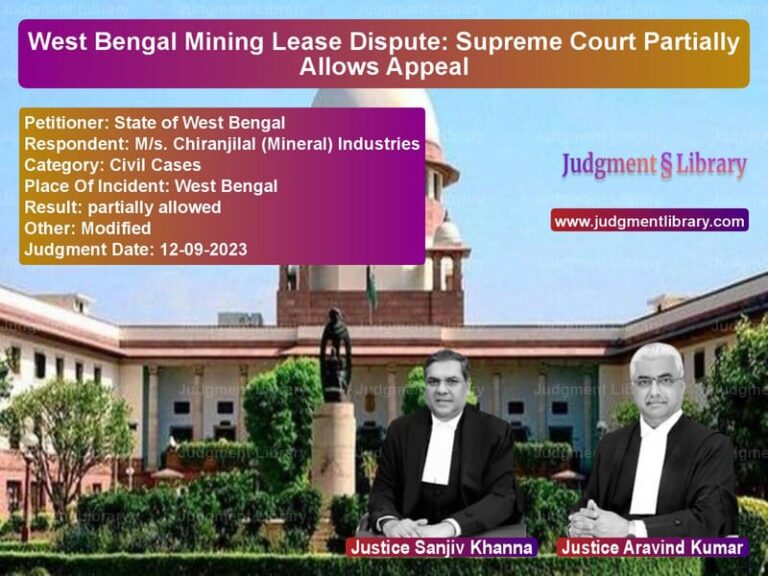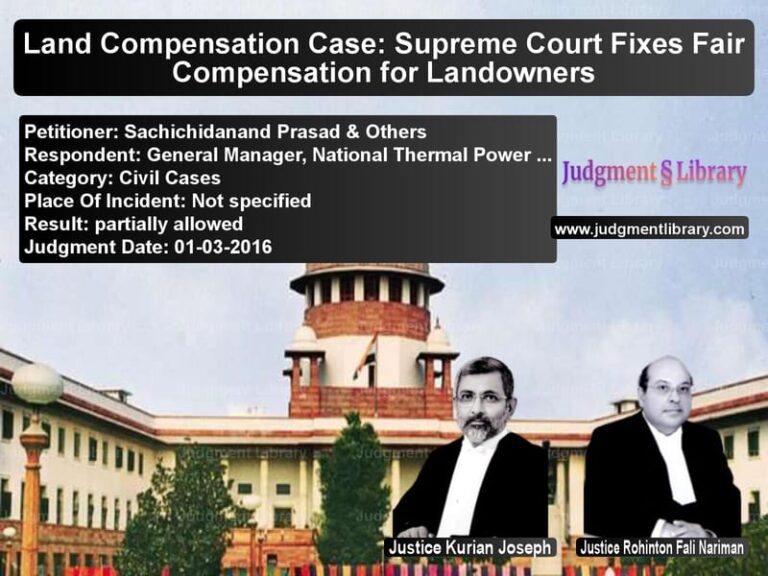Bribery in Legislative Voting: Supreme Court Calls for Larger Bench Review
The Supreme Court in Sita Soren vs. Union of India addressed the constitutional immunity of legislators in bribery cases related to voting. The case involved allegations that the appellant, a Jharkhand Mukti Morcha (JMM) MLA, accepted a bribe to vote for a candidate in the Rajya Sabha elections but eventually voted for her own party candidate. The judgment revisited the landmark ruling in PV Narasimha Rao vs. State (CBI/SPE) and referred the issue to a larger bench of seven judges.
Background of the Case
The case stems from the March 30, 2012 Rajya Sabha elections in Jharkhand. Sita Soren, an MLA, was accused of accepting a bribe from an independent candidate in exchange for her vote. However, the election results revealed that she did not vote for the alleged bribe-giver but instead cast her vote in favor of her party’s candidate. The election was later rescinded, and a fresh election was held.
Following an investigation, a charge sheet was filed against Sita Soren for corruption and bribery. She challenged the proceedings before the Jharkhand High Court, arguing that she was protected under Article 194(2) of the Constitution, which provides immunity to legislators for their votes and speeches in the House. The High Court rejected her plea, leading to the present appeal before the Supreme Court.
Read also: https://judgmentlibrary.com/supreme-court-strengthens-protection-for-child-victims-under-pocso-act/
Legal Issues Raised
- Whether Article 194(2) of the Constitution grants immunity to legislators in bribery cases related to voting.
- Whether the ruling in PV Narasimha Rao vs. State (CBI/SPE) requires reconsideration.
- Whether a Rajya Sabha election vote qualifies as a “proceeding of the House” under Article 194(2).
Petitioner’s Arguments (Sita Soren)
The appellant argued:
- Under Article 194(2), no MLA is liable for proceedings in any court concerning their vote in the House.
- The ruling in PV Narasimha Rao established that legislators are immune from prosecution if the charge relates to their voting.
- Since she ultimately did not vote for the alleged bribe-giver, there was no criminal offense.
- The High Court erred in refusing to quash the charge sheet, as the case lacked merit.
Respondent’s Arguments (Union of India)
The Union of India contended:
- Bribery is a criminal offense independent of legislative immunity.
- The Constitution does not shield a legislator from prosecution for accepting bribes, even if they ultimately do not act on the bribe.
- Unlike parliamentary debates, voting in Rajya Sabha elections is not a “proceeding of the House” and does not attract immunity under Article 194(2).
- The ruling in PV Narasimha Rao requires reconsideration, as it created an anomalous situation where bribery linked to voting could be protected from prosecution.
Supreme Court’s Ruling
The Supreme Court ruled that the issue required examination by a larger bench of seven judges.
1. Relevance of PV Narasimha Rao Judgment
- The Court noted that in PV Narasimha Rao, a five-judge bench ruled that legislators are immune from prosecution for their votes.
- However, two judges had dissented, arguing that bribery should not be protected under legislative immunity.
- The Court acknowledged the need to reconsider this ruling in light of its implications for probity in public life.
2. Whether Rajya Sabha Elections Are a Proceeding of the House
- The Court found that voting in Rajya Sabha elections differs from parliamentary votes on legislation or motions.
- Unlike debates in the Assembly, Rajya Sabha elections occur outside the legislative chamber, raising doubts about whether they qualify for immunity.
3. Anomalies in Legislative Immunity for Bribery
- The Court acknowledged that under the existing ruling, a legislator who accepts a bribe but does not vote can be prosecuted.
- However, if they accept a bribe and vote accordingly, they might be immune—creating a contradiction.
- This issue warranted a larger bench’s review to ensure consistency in constitutional interpretation.
Final Judgment
The Supreme Court:
- Referred the matter to a seven-judge bench for reconsideration.
- Held that the interpretation of Article 194(2) in bribery cases required a fresh review.
- Did not grant immediate relief to the appellant but kept her case pending.
Impact of the Judgment
This ruling has wide-ranging implications:
- Re-examination of legislative immunity: The case may redefine whether legislators can be prosecuted for bribery.
- Ensuring accountability: If immunity is revoked, legislators will face criminal liability for corruption in voting.
- Clarification on parliamentary privileges: The ruling will determine whether Rajya Sabha elections count as “proceedings of the House.”
Conclusion
The Supreme Court’s decision in Sita Soren vs. Union of India has set the stage for a landmark ruling on legislative immunity and corruption. By referring the matter to a larger bench, the Court has recognized the need to balance parliamentary privileges with accountability for bribery. The upcoming ruling will have significant consequences for how legislators are held responsible for their actions, ensuring greater transparency in Indian democracy.
Read also: https://judgmentlibrary.com/supreme-court-directs-strict-implementation-of-right-to-information-act/
Petitioner Name: Sita Soren.Respondent Name: Union of India.Judgment By: Justice Dhananjaya Y Chandrachud, Justice A S Bopanna, Justice M M Sundresh, Justice J B Pardiwala, Justice Manoj Misra.Place Of Incident: Jharkhand.Judgment Date: 20-09-2023.
Don’t miss out on the full details! Download the complete judgment in PDF format below and gain valuable insights instantly!
Download Judgment: sita-soren-vs-union-of-india-supreme-court-of-india-judgment-dated-20-09-2023.pdf
Directly Download Judgment: Directly download this Judgment
See all petitions in Fundamental Rights
See all petitions in Public Interest Litigation
See all petitions in Legislative Powers
See all petitions in Separation of Powers
See all petitions in Judgment by Dhananjaya Y Chandrachud
See all petitions in Judgment by A. S. Bopanna
See all petitions in Judgment by M.M. Sundresh
See all petitions in Judgment by J.B. Pardiwala
See all petitions in Judgment by Manoj Misra
See all petitions in Remanded
See all petitions in supreme court of India judgments September 2023
See all petitions in 2023 judgments
See all posts in Constitutional Cases Category
See all allowed petitions in Constitutional Cases Category
See all Dismissed petitions in Constitutional Cases Category
See all partially allowed petitions in Constitutional Cases Category

